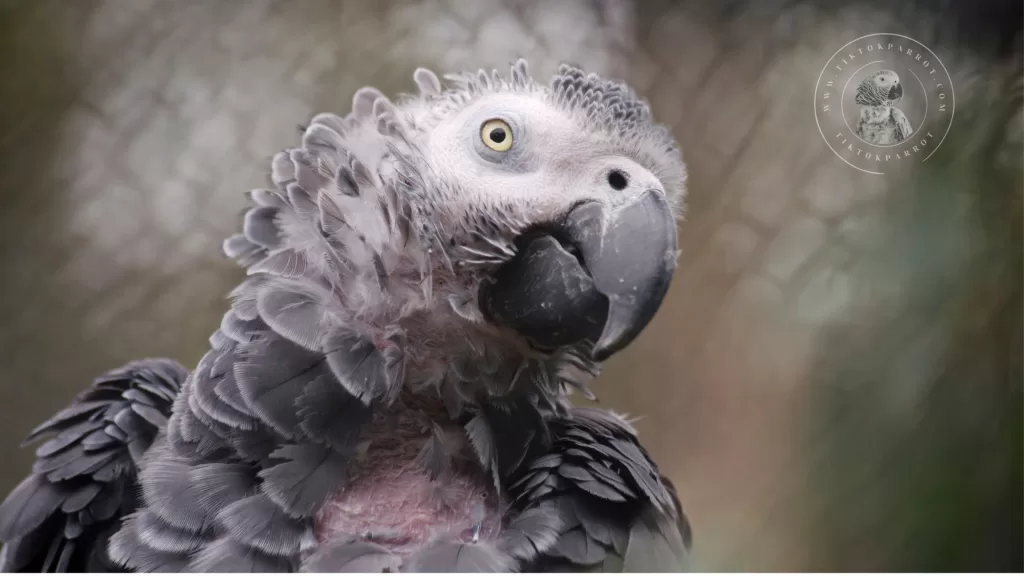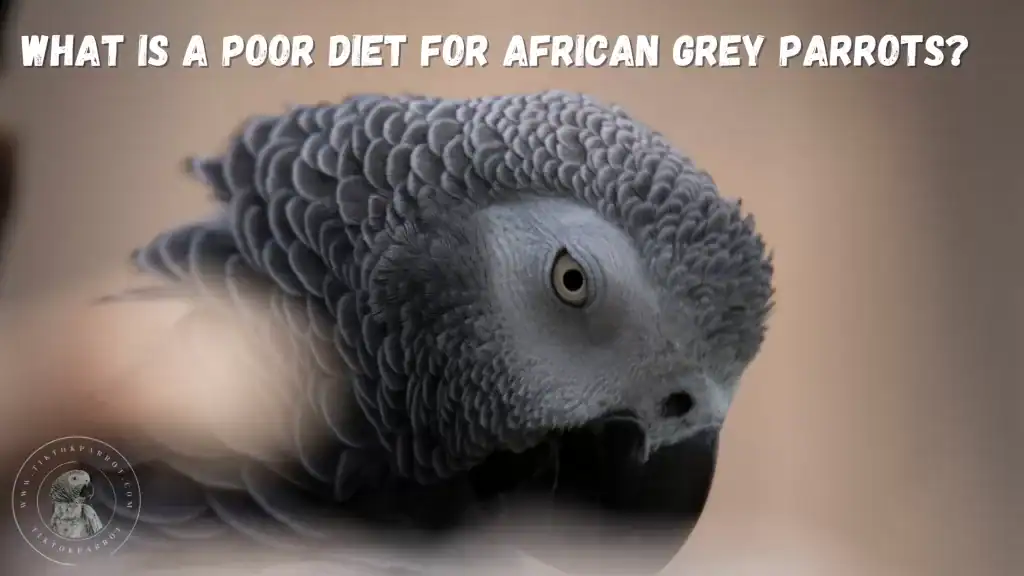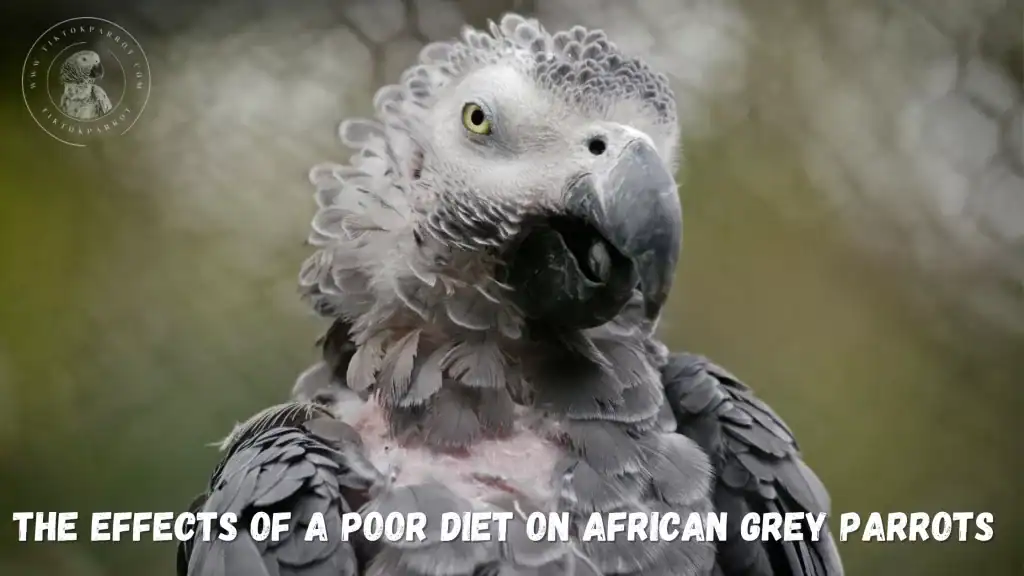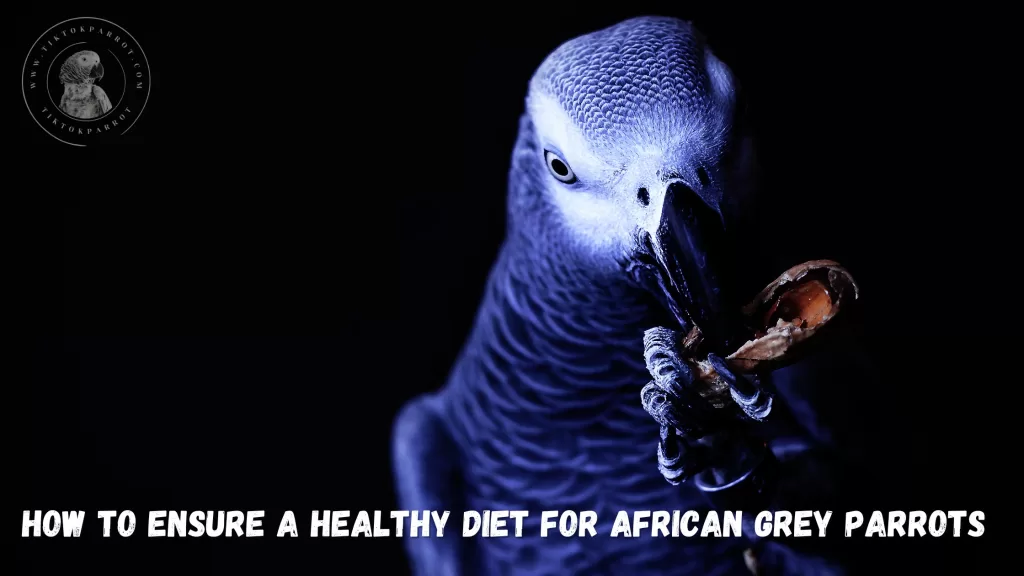African Grey parrots are known for their high intelligence, incredible talking ability, and long lifespan. However, despite their hardiness, they can suffer from serious health issues if they don’t receive a proper diet. In this article, we’ll examine the hidden dangers of a poor diet for African Grey parrots.
Discover the hidden dangers of a poor diet for African Grey parrots in this informative article. Learn about the harmful effects of nutrient deficiencies, high-fat diets, and toxic foods, and find out how to ensure a healthy diet for your parrot. Plus, get answers to common FAQs about feeding African Greys.
What is a poor diet for African Grey Parrots?
African Grey parrots, renowned for their exceptional intelligence and striking appearance, require a carefully balanced diet to maintain their health and well-being. But what happens when their diet falls short? Here we’ll explore the hidden dangers of a poor diet for Grey parrots and offer guidance on how to provide your avian companion with the nutrients they need to thrive.
Not enough nutrients
A poor diet for an African Grey parrot can mean they aren’t receiving all the necessary nutrients to maintain a healthy lifestyle. A lack of calcium, vitamin D3, and vitamin A can lead to serious health issues, such as weak bones, poor feather health, and a weakened immune system.
Too much fat
Another danger is feeding African Grey parrots a diet that is too high in fat. This can lead to obesity, which can cause liver disease, heart disease, PDD and other health issues.
Feeding the wrong foods
Feeding African Grey parrots the wrong foods can also be detrimental to their health. For example, they should not be fed avocado, chocolate, or caffeine, which can be toxic to them.
The effects of a poor diet on African Grey Parrots
Grey parrots require a balanced diet consisting of fresh fruits, vegetables, grains, and protein to maintain their health. A poor diet lacking in essential nutrients can lead to various health issues including:
Feather plucking
Feather plucking is a common problem in African Grey parrots, and a poor diet can contribute to this behavior. If a bird is not receiving enough protein, vitamins, or minerals, they may start to pluck their feathers.
A deficiency in essential nutrients can result in unhealthy feathers and skin, causing your parrot to start plucking their feathers.
Weak immune system
A poor diet can also lead to a weakened immune system, making African Grey parrots more susceptible to illnesses and diseases. An inadequate diet can weaken your parrot’s immune system, making them susceptible to infections and illnesses.
Liver disease
Obesity caused by a high-fat diet can lead to liver disease in African Greys.
Weak bones
Grey parrots need calcium and vitamin D3 to maintain healthy bones. A lack of these nutrients can lead to weak bones and bone fractures. Calcium and vitamin D deficiencies can lead to brittle bones and even fractures.
Behavioral Problems
An improper diet can affect your parrot’s mood and behavior, leading to increased aggression or depression.
How to ensure a healthy diet for African Grey Parrots
To prevent the hidden dangers of a poor diet for African Grey parrots, it’s essential to provide a balanced and varied diet that includes the following:
Pellets
Pellets are a balanced and complete diet for Grey parrots. They contain all the necessary nutrients and are easy to store and serve. High-quality pelleted diets should form the foundation of your African Grey’s diet, providing essential nutrients in the right proportions.
Fresh fruits and vegetables
Fresh fruits and vegetables should also be a part of an Grey’s diet. These provide important vitamins and minerals and help keep birds mentally stimulated. Offer a variety of fresh fruits and vegetables to supply additional vitamins and minerals, along with some natural foraging opportunities.
Protein Sources
Include a moderate amount of protein, such as cooked lean meats, legumes, or low-fat dairy products.
Healthy Fats
Incorporate healthy fats, like those found in nuts and seeds, to support brain and heart health.
Calcium and Vitamin D
Ensure your parrot receives adequate calcium and vitamin D through their diet or supplements to support strong bones and proper muscle function.
Nuts and seeds
Nuts and seeds can also be fed in moderation, as they provide healthy fats and protein.
Avoid toxic foods
It’s essential to avoid feeding African Grey parrots toxic foods, such as avocado, chocolate, and caffeine.
The Not-So-Great Grub: Foods to Avoid
Some foods can be harmful to your African Grey parrot and should be avoided:
- Avocado (It killed my parrot
)
- Chocolate
- Coffee and tea
- Alcohol
- High-fat, salty, or sugary foods
- Fruit seeds and pits
Monitoring Your Parrot’s Health: Signs of Trouble
Keep an eye out for these signs that may indicate your African Grey parrot is suffering from a poor diet:
- Weight loss or gain
- Changes in feather quality or color
- Lethargy or decreased activity
- Vomiting or diarrhea
- Changes in behavior or mood
My Final Thoughts
A poor diet can have serious consequences for African Grey parrots. It’s important to provide them with a balanced and complete diet, including pellets, fresh fruits and vegetables, and nuts and seeds. Feeding them toxic foods or a diet that is too high in fat can lead to serious health issues. By following these guidelines, you can help ensure your Grey parrot lives a long, healthy life.
FAQs (frequently asked questions)
Addressing Your African Grey Diet Concerns!
Can African Grey Parrots eat meat?
African Grey parrots are herbivores and should not be fed meat.
Is it safe to feed African Grey Parrots peanuts?
Peanuts should be fed in moderation, as they are high in fat.
What fruits are safe for African Grey Parrots to eat?
Safe fruits for African Grey Parrots include apples, bananas, grapes, and melons.
Can African Grey Parrots eat bread?
Bread should be fed in moderation, as it is high in carbohydrates and low in nutrients.
How often should I feed my African Grey Parrot fresh fruits and vegetables?
Fresh fruits and vegetables should be fed daily to African Grey Parrots.
Is it necessary to provide supplements to African Grey Parrots on top of their regular diet?
Supplements may be necessary if your African Grey parrot is not receiving enough of certain vitamins or minerals through its regular diet. It’s best to consult with a veterinarian who specializes in avian medicine to determine if supplements are necessary and in what quantities.
Can African Grey Parrots eat cooked food or should it be raw?
African Grey parrots can eat cooked food, but it’s important to avoid adding seasoning or other ingredients that could be harmful to their health. Raw food is also safe for African Grey parrots as long as it’s thoroughly washed.
How much food should I be feeding my African Grey Parrot?
The amount of food that you should feed your African Grey parrot depends on its age, weight, and activity level. A general guideline is to provide enough food to last throughout the day, without overfeeding.
Can African Grey Parrots eat dairy products?
African Grey parrots are not able to digest lactose, so it’s best to avoid feeding them dairy products.
Are there any specific fruits or vegetables that African Grey Parrots should avoid?
African Grey parrots should avoid fruits and vegetables that are high in sugar, such as mangoes and pineapples. They should also avoid vegetables that are high in oxalic acid, such as spinach and Swiss chard, as these can interfere with calcium absorption.
Should I be concerned if my African Grey Parrot stops eating its regular diet?
Yes, if your African Grey parrot stops eating its regular diet, it’s important to consult with a veterinarian as this could be a sign of a health issue.
Can African Grey Parrots eat honey?
Honey should be avoided, as it can contain harmful bacteria that can be dangerous for African Grey parrots.
Is it safe to feed my African Grey Parrot insects or bugs?
Insects and bugs can be a good source of protein for African Grey parrots, but it’s important to ensure that they are free from any harmful chemicals or pesticides.
What kind of seeds are best for African Grey Parrots?
African Grey parrots should be fed a variety of seeds, including sunflower seeds, safflower seeds, and hemp seeds.
How can I tell if my African Grey Parrot is overweight?
Signs of an overweight African Grey parrot include difficulty flying, lethargy, and a lack of interest in toys or other activities.
Is it safe to feed my African Grey Parrot human food, such as pasta or rice?
Some human foods can be fed to African Grey parrots in moderation, but it’s important to avoid seasoning or ingredients that could be harmful to their health.
Can African Grey Parrots eat spicy foods?
African Grey parrots should avoid spicy foods, as they can cause digestive issues and other health problems.
Is it necessary to provide my African Grey Parrot with a variety of different foods?
Yes, it’s important to provide African Grey parrots with a variety of different foods to ensure that they receive all the necessary nutrients.
How important is water for African Grey Parrots and how much should they be drinking?
Water is very important for African Grey parrots, and they should have access to fresh, clean water at all times. The amount of water they drink will vary depending on their size, age, and activity level.
Can African Grey Parrots eat frozen or canned fruits and vegetables?
Frozen or canned fruits and vegetables can be fed to African Grey parrots, as long as they are free from added sugars or preservatives. However, it’s best to serve fresh fruits and vegetables whenever possible, as they contain the highest amount of nutrients. If using frozen or canned products, be sure to thaw or rinse them thoroughly before feeding them to your African Grey parrot.
Can African Grey Parrots eat bread with seeds or nuts?
Bread with seeds or nuts should be fed in moderation, as they are high in fat and can contribute to obesity.
Is it safe to feed my African Grey Parrot grains, such as quinoa or rice?
Grains can be a healthy addition to an African Grey parrot’s diet, but it’s important to avoid seasoning or ingredients that could be harmful to their health.
Can African Grey Parrots eat canned or cooked beans?
Canned or cooked beans can be fed to African Grey parrots, but it’s important to avoid seasoning or ingredients that could be harmful to their health.
How often should I change my African Grey Parrot’s diet?
It’s important to maintain a consistent diet for African Grey parrots, but offering a variety of foods can help ensure they receive all the necessary nutrients. Consult with a veterinarian to determine the best diet plan for your African Grey parrot.
Can African Grey Parrots eat fruit pits or seeds?
Fruit pits and seeds should be avoided, as they can be toxic or cause digestive issues.
Is it safe to feed my African Grey Parrot cooked eggs?
Cooked eggs can be a healthy addition to an African Grey parrot’s diet, but it’s important to avoid seasoning or ingredients that could be harmful to their health.
Can African Grey Parrots eat cooked or raw meat?
African Grey parrots are herbivores and should not be fed meat, cooked or raw.
Is it necessary to provide my African Grey Parrot with a cuttlebone or mineral block?
Providing a cuttlebone or mineral block can help ensure that African Grey parrots receive the necessary amount of calcium and minerals for healthy bones and feathers.
Can African Grey Parrots eat seeds from fruits, such as apples or pears?
Seeds from fruits can be fed to African Grey parrots, but it’s important to avoid any that may be toxic or cause digestive issues.
How can I make sure my African Grey Parrot is getting enough exercise?
Providing toys and perches of various sizes and textures can help ensure that African Grey parrots receive enough exercise. Encouraging them to fly short distances can also be beneficial.
If you found this blog helpful, It would be great if you could share it with your family and friends who might find it useful as well.
You might like to read these as well
African Grey Parrots: The Ultimate Guide to Care and Training
African Grey Parrot Male or Female? (Determine Gender of African Grey)
The Surprising Benefits of Owning an African Grey Parrot
Understanding of Grey Parrot’s Body Language
The Importance of a Cage for Your African Grey Parrot
Mastering the Art of Taming an African Grey Parrot
Is Your African Grey a Jealous Bird? Here’s What You Need to Know!
The Mesmerizing Eyes of African Grey Parrot & What They Can Tell
Unlock the Secrets of Choosing the Perfect African Grey Parrot
The Battle of the Birds: African Grey Parrot vs Macaw
The Battle of the Birds: African Grey Parrot vs Crows
Winning Parrot Names: How to Choose a Name That Strengthens Your Bond
The Secret Life of African Grey Parrots: What You Need to Know Before Owning One
For more useful content about African grey parrots, you can subscribe my site with your email to get notification upon publishing a new blog, the subscribe box you can see on the right side of this page. Also if you get an alert on your web browser while browsing my site, allow it and that will also give you an alert whenever I publish a new blog.
Stay safe and much love !







